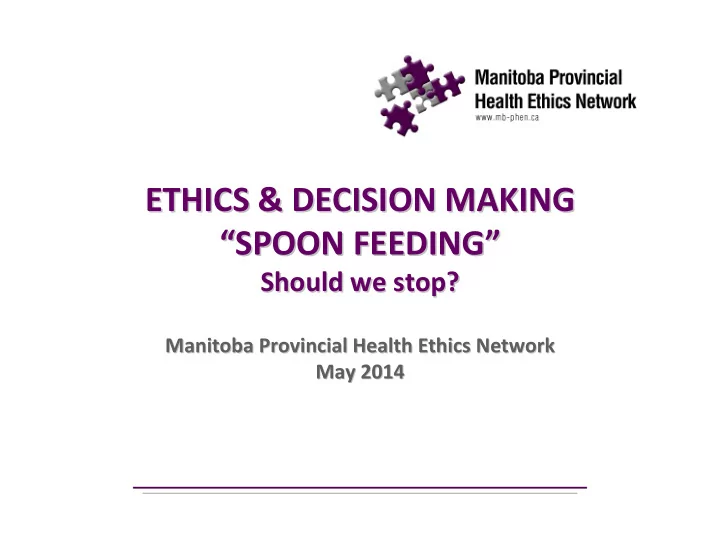

ETHICS & DECISION MAKING ETHICS & DECISION MAKING “SPOON FEEDING SPOON FEEDING” ” “ Should we stop? Should we stop? Manitoba Provincial Health Ethics Network Manitoba Provincial Health Ethics Network May 2014 May 2014
Good News Good News It was a normal day in Sharon Springs, Kansas, when a Union Pacific crew boarded a loaded coal train for the long trek to Salina.
Bad News Bad News Just a few miles into the trip a wheel bearing became overheated and melted, letting a metal support drop down and grind on the rail, creating white hot molten metal droppings spewing down to the rail.
Good News Good News A very alert crew noticed smoke about halfway back in the train and immediately stopped the train in compliance with the rules.
Bad News Bad News The train stopped with the hot wheel over a wooden bridge with creosote tiles and trusses.
The crew tried to explain this to Union Pacific higher ‐ ups, but were instructed not to move the train! They were informed that Rules prohibited moving the train when a part was found to be defective!
The RULES are the RULES ! Don’t ever let common sense get in the way of a good Disaster!
ENGAGING ETHICALLY ENGAGING ETHICALLY
GUIDING PRINCIPLES GUIDING PRINCIPLES BEAUCHAMP & CHILDRESS BEAUCHAMP & CHILDRESS Principles that govern ethical relationships between healthcare providers and patients. (Beauchamp and Childress 6 th ed)
PRINCIPLES PRINCIPLES •Nonmaleficence •Beneficence •Justice •Autonomy
FRAMEWORK FRAMEWORK Facts ‐ Known, missing, conflicting info, what’s needed to move forward? Ethical issue – What is problem, legal issue, standards of practice, personality conflict
FRAMEWORK FRAMEWORK Who are the stakeholders ‐ anyone missing, roles & responsibilities, conflicting interpretations Analyze your biases ‐ influence your perception
FRAMEWORK FRAMEWORK Build best/worse case scenario Prepare risk analysis associated with alternative plans
FRAMEWORK FRAMEWORK Policies/guidelines Make a plan/include alternatives Evaluate
WHAT TO DO? WHAT TO DO?
MORAL DISTRESS MORAL DISTRESS The pain or anguish affecting mind, body or relationships in response to a situation in which the person: • Is aware of the moral problem • Acknowledges moral responsibility • Makes a moral judgment about the correct action but as a result of real or perceived constraints, participates in or allows the moral wrong ‐ doing to occur (Nathaniel. A., 2006)
WHAT DOES IT FEEL LIKE? WHAT DOES IT FEEL LIKE?
FACTORS GENERATING MORAL FACTORS GENERATING MORAL DISTRESS DISTRESS CLINICAL FACTORS INTERNAL FACTORS EXTERNAL or ENVIRONMENTAL 1. Clinical Situations FACTORS • Unnecessary tests/treatment • Heuristics 2. Factors internal to • Lack of time • Prolonging dying through aggressive • Perceived powerlessness treatment the caregiver • Measuring results replaces • Lack of Knowledge relationships • Inadequate informed consent 3. Factors external to • Personal/professional value conflict • Lack of Community resources the caregiver • Caregiver competence • Lack understanding of full situation • Compromised care due to pressure • Lying to or deceiving patients 4. Inherent in the to reduce costs environment • Inappropriate use of resources • Co ‐ worker issues or differing professional perspectives
TYPICAL RESPONSE TYPICAL RESPONSE Springboard into action Avoidance, judge/blame others Withdrawal Frustration Job dissatisfaction
ETHICS IS NOT EASY… …BUT IT IS EASIER BUT IT IS EASIER ETHICS IS NOT EASY WHEN WE: WHEN WE: Communicate Systematic approach Aware of biases Respect relationship dynamics
Consent and Capacity Board Consent and Capacity Board Independent body with Legal authority Review decisions and compliance of SDM Provide guidance
Competent People have Competent People have Considerable Control & Legal Considerable Control & Legal Authority to Direct Care Authority to Direct Care Incompetent People Incompetent People Have Much Less! Have Much Less!
HEALTH CARE CONSENT ACT HEALTH CARE CONSENT ACT Dictates rules and guidelines regarding all forms of capacity and authorization to Substitute Decision Making
ADVANCE CARE PLAN ADVANCE CARE PLAN Legal document Sometimes made ten years prior Ambiguous writing / Black and White instructions often from a bank of lists provided by a lawyer
SPECIFIC DETAILS SPECIFIC DETAILS Regarding nutrition once I am in severe dementia Regarding Comfort Care, which I request in any phase of dementia Protocols for stopping food and water
Surrogate Decision Making Surrogate Decision Making • Substituted Judgment Standard “Don the mental mantel of the incompetent” Reliant on the decision maker’s familiarity with the client’s view and values Risk of substituting own values/needs What if the client has never been competent or discussed the issue literally? Beauchamp & Childress (2009)
Surrogate Decision Making Surrogate Decision Making • Pure Autonomy Standard Applies exclusively to formerly autonomous judgments even in the absence of a formal directive Written documentation (Living Will) & Oral directive dictate decisions about care Satisfactory evidence? – Risk misinterpretation of value judgments from past events Beauchamp & Childress
Surrogate Decision Making Surrogate Decision Making • Best Interest Standard Can validly override advance directives if the decision goes against their best interest. Ability to anticipate a future state often challenge reliance of advance directives Quality of life? Beauchamp & Childress
Do the patient’s current wishes align with her previous directive? If not, Which should we follow?
Feeding or Force Feeding Feeding or Force Feeding Should not Force Feed! How can we distinguish between these? When is it considered medical intervention? When you can no longer feed yourself?
Margot’ ’s Choice s Choice Margot Retired nurse 1991 ‐ “Statement of Wishes” desired level of care should she become incapacitated. Now in Nursing home unable to communicate. Mobility limited and depends on spoon feeding of pureed foods for nourishment.
Conflicting Interpretation Conflicting Interpretation Family claim no emotional reaction when eating Care team say she does communicate small wishes when eating
Margot’ ’s Choice s Choice Margot
COURT RULING COURT RULING MUST CONTINUE SPOON FEEDING, TO DO OTHERWISE WOULD BE DEEMED AS NEGLECT OF BASIC CARE
Ethical Challenges Ethical Challenges Patient & Family For Caregivers For the Health Care System
www.mb-phen.ca
Recommend
More recommend